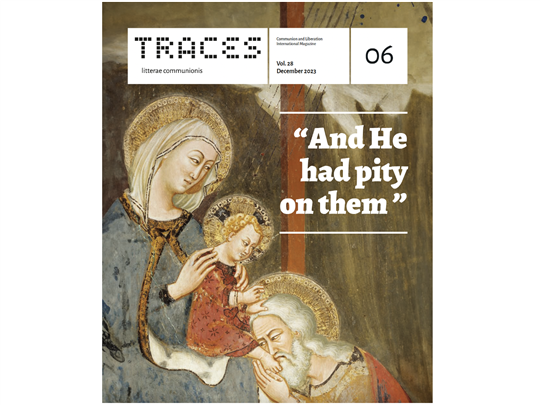
Traces, No. 6, December 2023
Here, now“No explosion, wherever it may resound, over the earth, under the earth, or in the boundless spaces of the cosmos, can ever deafen the heart of those who have heard these electrifying words of the Gospel: ‘The Word became flesh.’” The man who wrote these words, Fr. Vsevolod Špiller, an Orthodox priest under the Soviet regime, knew persecution, ideological fury, and “that tendency to the extreme” which, as sociologist Sergio Belardinelli says in this issue, “is manifesting itself on a planetary scale,” and of which “terroristic violence is only the most eloquent manifestation.” Yet Špiller was certain of an event more powerful than any other: the annunciation of God who becomes man. Today power and evil have other faces, and the tenderness of the coming Christmas would be an unbearable nothingness if it were not an outrageous fact, a love full of mercy that is more needed than air.
In these pages, Gabriel Romanelli, the parish priest of the Catholic church of Gaza, speaks of how the lived faith of his people makes their hearts unassailable even when everything around them is inhuman. The news of the fact of Christmas may seem to be overwhelmed by history, but it silently continues to change people’s way of living no matter what happens: “Far from divorcing us from reality, our faith (…) enables us to grasp reality’s deepest meaning; a new way of seeing opens up,” as the pope says in the lines quoted in the CL Christmas poster.
So “peace” is not a silencer of pain, but the seed of a new experience that allows us to stay in the ruins of homes and lives, to ask ourselves questions and understand what responds, looking full in the face both death and the evil that has reopened very deep traumas and wounds in whole peoples, like the evil that explodes in many families.
In this number we report on the gaze of some witnesses who do not want to turn away, from Cardinal Pietro Parolin, the Vatican secretary of state, to Maria Ruiz, a young woman in Jerusalem who, in the darkest hour, has said her yes to Christ as her contribution to the world.
Fr. Giussani reminded us in other years, faced by different wars: “When society reaches certain crucial passages, the true problem is that the judgment of praise or condemnation should first of all take into consideration the need for education of youth and adults; that is, of all women and men, because they are normal people who have the need to activate their own capacities for judgment and goodness. If humanity does not educate to a true esteem of the human being, and thus to real justice, it cannot be free from the disasters that humanity itself procures.” He added that “the true drama of current humanity” is the lack of “an education that matches up to the greatness and depth of the struggle among human beings.”
This means being educated as only those who have a father can be. In the current dramatic situation, it is clearer than ever that we all need to be reborn, as we have been reminded by the Latin patriarch of Jerusalem, Pierbattista Pizzaballa, who has never felt as called as he does now to “a higher level of fatherhood. A father is one who generates life. And here, now, there is great need to generate new life.”